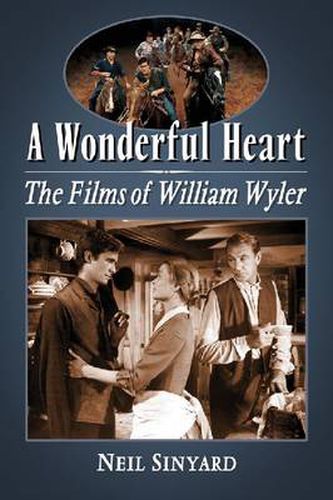Readings Newsletter
Become a Readings Member to make your shopping experience even easier.
Sign in or sign up for free!
You’re not far away from qualifying for FREE standard shipping within Australia
You’ve qualified for FREE standard shipping within Australia
The cart is loading…






This title is printed to order. This book may have been self-published. If so, we cannot guarantee the quality of the content. In the main most books will have gone through the editing process however some may not. We therefore suggest that you be aware of this before ordering this book. If in doubt check either the author or publisher’s details as we are unable to accept any returns unless they are faulty. Please contact us if you have any questions.
Revered by his cinematic peers, William Wyler (1902-1981) was one of the most honoured and successful directors of Hollywood’s Golden Age, with such classics as Dead End, Wuthering Heights, The Little Foxes, Roman Holiday and Ben-Hur. He won three directing Oscars and elicited over a dozen Oscar-winning performances from his actors. Such exacting performers as Bette Davis, Laurence Olivier and Charlton Heston counted him the best director they had worked with. Yet during the era of the
auteur
theory his films fell out of fashion, lacking, it was said, a distinctive stylistic and thematic signature.
This new critical study of Wyler’s work, the first in more than thirty years, challenges the notion of Wyler’s impersonality and offers a comprehensive reappraisal of his work, particularly of the underrated postwar films. It also provides a rebuttal of the auteurist criticism whose rigid categorisation of directors cannot adequately encompass the range of someone like Wyler, who put substance above style and had a breadth of human understanding that was not reducible to a cluster of characteristic themes. Supported by archival research in Los Angeles, the book traces the important milestones in Wyler’s career, the context of his films, the importance of legendary producer Sam Goldwyn - his distinguished war record and his principled opposition to blacklisting during the McCarthy era.
$9.00 standard shipping within Australia
FREE standard shipping within Australia for orders over $100.00
Express & International shipping calculated at checkout
This title is printed to order. This book may have been self-published. If so, we cannot guarantee the quality of the content. In the main most books will have gone through the editing process however some may not. We therefore suggest that you be aware of this before ordering this book. If in doubt check either the author or publisher’s details as we are unable to accept any returns unless they are faulty. Please contact us if you have any questions.
Revered by his cinematic peers, William Wyler (1902-1981) was one of the most honoured and successful directors of Hollywood’s Golden Age, with such classics as Dead End, Wuthering Heights, The Little Foxes, Roman Holiday and Ben-Hur. He won three directing Oscars and elicited over a dozen Oscar-winning performances from his actors. Such exacting performers as Bette Davis, Laurence Olivier and Charlton Heston counted him the best director they had worked with. Yet during the era of the
auteur
theory his films fell out of fashion, lacking, it was said, a distinctive stylistic and thematic signature.
This new critical study of Wyler’s work, the first in more than thirty years, challenges the notion of Wyler’s impersonality and offers a comprehensive reappraisal of his work, particularly of the underrated postwar films. It also provides a rebuttal of the auteurist criticism whose rigid categorisation of directors cannot adequately encompass the range of someone like Wyler, who put substance above style and had a breadth of human understanding that was not reducible to a cluster of characteristic themes. Supported by archival research in Los Angeles, the book traces the important milestones in Wyler’s career, the context of his films, the importance of legendary producer Sam Goldwyn - his distinguished war record and his principled opposition to blacklisting during the McCarthy era.